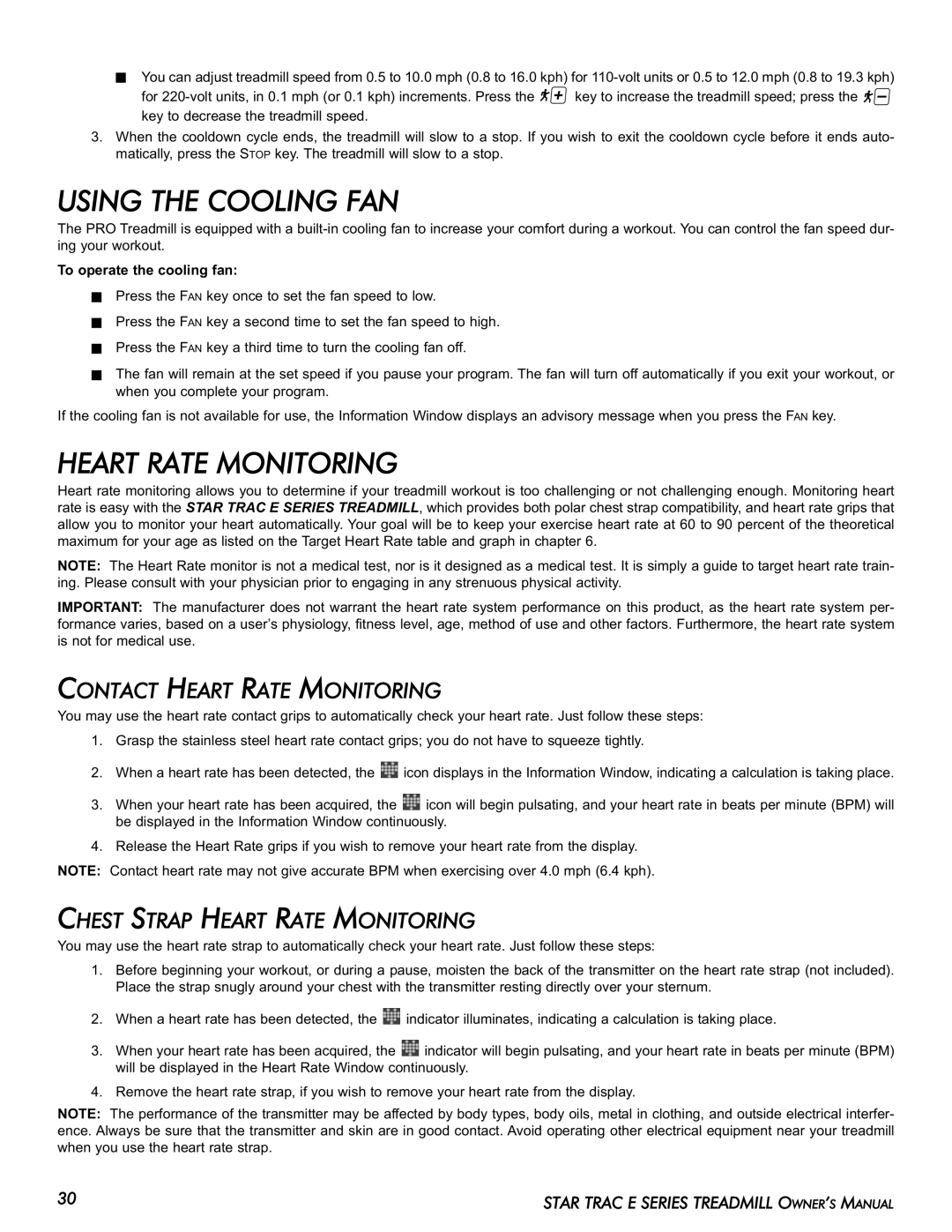■You can adjust treadmill speed from 0.5 to 10.0 mph (0.8 to 16.0 kph) for
for ![]()
![]()
![]() key to increase the treadmill speed; press the
key to increase the treadmill speed; press the ![]()
![]()
![]() key to decrease the treadmill speed.
key to decrease the treadmill speed.
3.When the cooldown cycle ends, the treadmill will slow to a stop. If you wish to exit the cooldown cycle before it ends auto- matically, press the STOP key. The treadmill will slow to a stop.
USING THE COOLING FAN
The PRO Treadmill is equipped with a
To operate the cooling fan:
■Press the FAN key once to set the fan speed to low.
■Press the FAN key a second time to set the fan speed to high.
■Press the FAN key a third time to turn the cooling fan off.
■The fan will remain at the set speed if you pause your program. The fan will turn off automatically if you exit your workout, or when you complete your program.
If the cooling fan is not available for use, the Information Window displays an advisory message when you press the FAN key.
HEART RATE MONITORING
Heart rate monitoring allows you to determine if your treadmill workout is too challenging or not challenging enough. Monitoring heart rate is easy with the STAR TRAC E SERIES TREADMILL, which provides both polar chest strap compatibility, and heart rate grips that allow you to monitor your heart automatically. Your goal will be to keep your exercise heart rate at 60 to 90 percent of the theoretical maximum for your age as listed on the Target Heart Rate table and graph in chapter 6.
NOTE: The Heart Rate monitor is not a medical test, nor is it designed as a medical test. It is simply a guide to target heart rate train- ing. Please consult with your physician prior to engaging in any strenuous physical activity.
IMPORTANT: The manufacturer does not warrant the heart rate system performance on this product, as the heart rate system per- formance varies, based on a user’s physiology, fitness level, age, method of use and other factors. Furthermore, the heart rate system is not for medical use.
CONTACT HEART RATE MONITORING
You may use the heart rate contact grips to automatically check your heart rate. Just follow these steps:
1.Grasp the stainless steel heart rate contact grips; you do not have to squeeze tightly.
2.When a heart rate has been detected, the ![]() icon displays in the Information Window, indicating a calculation is taking place.
icon displays in the Information Window, indicating a calculation is taking place.
3.When your heart rate has been acquired, the ![]() icon will begin pulsating, and your heart rate in beats per minute (BPM) will be displayed in the Information Window continuously.
icon will begin pulsating, and your heart rate in beats per minute (BPM) will be displayed in the Information Window continuously.
4.Release the Heart Rate grips if you wish to remove your heart rate from the display.
NOTE: Contact heart rate may not give accurate BPM when exercising over 4.0 mph (6.4 kph).
CHEST STRAP HEART RATE MONITORING
You may use the heart rate strap to automatically check your heart rate. Just follow these steps:
1.Before beginning your workout, or during a pause, moisten the back of the transmitter on the heart rate strap (not included). Place the strap snugly around your chest with the transmitter resting directly over your sternum.
2.When a heart rate has been detected, the ![]() indicator illuminates, indicating a calculation is taking place.
indicator illuminates, indicating a calculation is taking place.
3.When your heart rate has been acquired, the ![]() indicator will begin pulsating, and your heart rate in beats per minute (BPM) will be displayed in the Heart Rate Window continuously.
indicator will begin pulsating, and your heart rate in beats per minute (BPM) will be displayed in the Heart Rate Window continuously.
4.Remove the heart rate strap, if you wish to remove your heart rate from the display.
NOTE: The performance of the transmitter may be affected by body types, body oils, metal in clothing, and outside electrical interfer- ence. Always be sure that the transmitter and skin are in good contact. Avoid operating other electrical equipment near your treadmill when you use the heart rate strap.
30 | STAR TRAC E SERIES TREADMILL OWNER’S MANUAL |
